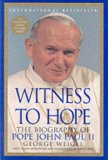Summary | Excerpt | Reviews | Readalikes | Genres & Themes | Author Bio

Critics' Opinion:
Readers' Opinion:
First Published:
Oct 1999, 992 pages
Paperback:
Apr 2001, 1008 pages
The Marne, Tannenberg, and Verdun; the Battle of Britain and Midway; Stalingrad and D-Day's Omaha Beach - according to the conventional wisdom, these were the decisive battles of the twentieth century. Only Poles and professional historians remember the August 1920 Battle of the Vistula, or, as pious Poles insist, the "Miracle on the Vistula." Yet much turned on this, including the destiny of a three-month-old infant named Karol Jozef Wojtyla, born in the small provincial city of Wadowice the previous May 18.
In the summer of 1920, Polish history seemed set to repeat itself in a particularly ugly way. The Second Polish Republic, the first independent Polish state since 1795, was about to be strangled in its cradle as the Red Cavalry of General Semen Budennyi drove westward out of Ukraine, sweeping all before it. For Poles, it brought back memories of other invasions from the steppes and other preludes to national disaster. For Lenin, who wanted to "probe Europe with the bayonet of the Red Army," the infant Polish Republic was of no moral or historic consequence. It was simply the highway along which Trotsky's Red Army legions would march to Germany, triggering a revolutionary uprising across all of Europe. To make sure that any resistance would be summarily crushed, the Provisional Polish Revolutionary Committee, the puppet regime to be installed in the wake of the Red Army's inevitable victory, would be led by Feliks Dzerzhinskii, head of the Cheka, the Soviet secret police, the most feared man in Bolshevik Russia.
By August 12, as one historian has put it, "it was clear to most observers in Warsaw that the last desperate week of the resurrected Poland had arrived." The entire diplomatic corps fled, with one exception: Archbishop Achille Ratti, the Pope's representative. A Polish delegation left for Minsk, where they hoped to start negotiations for an armistice or a surrender with the Soviets. Dzerzhinskii was headed for Wyszkow, thirty miles from Warsaw, from which he expected to enter a fallen capital on August 17.
But Marshal Jozef Pilsudski, who dominated the life of the Second Polish Republic from its inception in 1918 until his death in 1935, was not prepared to concede defeat. Pilsudski's intelligence operatives had detected a gap between the two corps of Trotsky's army. In a daring move, Pilsudski pulled some of Poland's best divisions from the lines on which they were engaged and secretly redeployed them to take advantage of the gap between the Soviet forces. On August 16, the Poles attacked, and by the night of the 17th, the Red Army, which had begun its own attack on Warsaw on the 14th, had been reduced to a rabble of fleeing refugees at a cost of fewer than 200 Polish casualties.
Distracted by that year's calamitous flu epidemic and still reeling from the slaughters of the First World War, western Europe seemed unaware that, but for the Poles, the Red Army might just as easily have been camped along the English Channel as fleeing back into Great Russia. Lenin, though, understood that world history had just taken a decisive turn. In a rambling speech on September 20 to a closed meeting of communist leaders, he went into dialectical dithyrambs trying to explain why "the Polish war . . . [was] a most important turning point not only in the politics of Soviet Russia but also in world politics." Germany, he claimed, was "seething." And "the English proletariat had raised itself to an entirely new revolutionary level." It was all there, ripe for the taking. But Pilsudski and his Poles had inflicted a "gigantic, unheard-of defeat" on the cause of world revolution. At the end of his speech, Lenin swore that "we will keep shifting from a defensive to an offensive strategy over and over again until we finish them off for good." But for now, the westward thrust of Bolshevism had been rebuffed.
Among many other things, Pilsudski's stunning victory meant that Karol Wojtyla would grow up a free man in a free Poland, a member of the first generation of Poles to be born in freedom in 150 years. An experience he would never forget, it became part of the foundation on which he, too, would change the history of the twentieth century.
Copyright © 1999 by George Weigel. All rights reserved. This excerpt, or any parts thereof, may not be reproduced in any form without permission.





The Flower Sisters
by Michelle Collins Anderson
From the new Fannie Flagg of the Ozarks, a richly-woven story of family, forgiveness, and reinvention.

The House on Biscayne Bay
by Chanel Cleeton
As death stalks a gothic mansion in Miami, the lives of two women intertwine as the past and present collide.

The Funeral Cryer by Wenyan Lu
Debut novelist Wenyan Lu brings us this witty yet profound story about one woman's midlife reawakening in contemporary rural China.
Your guide toexceptional books
BookBrowse seeks out and recommends the best in contemporary fiction and nonfiction—books that not only engage and entertain but also deepen our understanding of ourselves and the world around us.